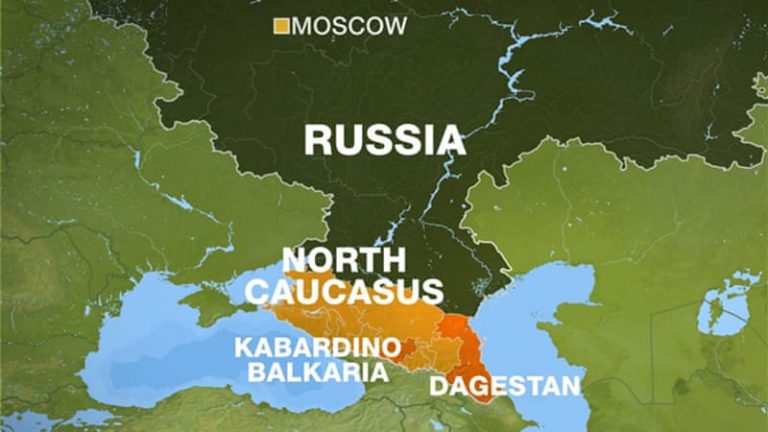The North Caucasus is one of the most flawed regions for the central government of the Russian Federation. The uncontrolled COVID-19 spread in certain parts of the North Caucasus and the after-effect of lockdown will deepen the crisis. The Kremlin is set to get tough with social clamor and popular discontent among the region’s residents. For that purpose, security forces from other parts of Russia are sent to the North Caucasus; their salaries meant to be increased significantly.
The North Caucasus was among the first Russia’s territories to lock down. Nevertheless, official figures as of April 13, show that the number of confirmed cases in the North Caucasus went up to 350. The Stavropol Territory with 86 cases confirmed and Dagestan – 84, are at the top of the list. Meanwhile, the coronavirus passed from the third to the fourth threat level in the Republic of Dagestan, which says the infection has started to spread wildly, Nikolai Pavlov, head of the Russian consumer protection agency Rospotrebnadzor claims. Abdurakhman Martazanov, the mufti of the Republic of Ingushetia died of coronavirus. Official sources underreport the infection rate in the region over the lack of mass testing of the population with the symptoms. Patients are usually admitted to the hospital with terminal illness.
At the same time, the steps made by the governments of the North Caucasus republics, have already triggered economic collapse and mass layoffs. Even before the pandemic, the unemployment rate of the North Caucasus Federal District was the highest in Russia – 10.5%, according to official records only, with a population of 9.8 million people. Meanwhile, the unemployment rate in Ingushetia is 26.3%, in North Ossetia – 13.6%, in Dagestan – 13.5%, in Karachay-Cherkessia – 11.4%, and Kabardino-Balkaria – 11.2%.
The things have just got worse with heavy-handed measures installed. Dagestan’s Ministry of Labor alone officially reports that 83 enterprises have already announced the upcoming dismissals of more than 2.7 thousand workers as of April 1. At the same time, the agency indicated that more than 1.9 thousand employees were at risk of dismissal, including the employees of the Dagdizel Plant OJSC, Dagestan Steklo Tara LLC, the Fiber Glass Plant OJSC, and Caspian Precision Mechanics Plant OJSC.
Experts claim the numbers are even higher. Fadik Mugulov, an economist and Dagestan’s Union of Entrepreneurs executive director, said that about 100 thousand Dagestan’s residents might lose their jobs over the economic crisis amid a new type of coronavirus pandemic, while the total number of unemployed in the region might exceed 400 thousand people by the end of this year.
Natalya Kiseleva, professor at RANEPA’s North-Caucasian Institute, is sure that tourism and service businesses will be among the most likely hurt in the North Caucasus. She believes the living standards will massively go down throughout the district. “Small business will be hard-hit and the number of self-employed will decrease, especially in distributive trade and consumer services. As a result, the already low living standards in the North Caucasus will go down,” the expert said.
Growth in candidates for volunteer military service at the Southern Military District implies that sharp rise in mass unemployment among the young population has begun. Ostensibly, the number of people stating their willingness to enlist in volunteer military service among the residents of Kabardino-Balkaria, Chechnya, Ingushetia, and North Ossetia exceeded the same period of the previous year by 10%.
Local authorities are trying to mitigate the effects on the economy and prevent a social upheaval. So, a number of large enterprises, the grocery part of agricultural markets, and some inter-municipal routes resumed work in Adygea starting from April 13. Manicure, pedicure, and haircut services got the green light during the lockdown in North Ossetia. However, sports centers and dental clinics were asked not to resume the work so far. The government of Kabardino-Balkaria allowed some dominant and systemic companies to resume operation. However, that would hardly change things. If pandemic continues, the wave of social upheaval might cover the North Caucasus by summer.
The Kremlin seems to be planning for such scenario and is set to maintain the regional stability by force. On April 5, the Ingush human rights activist Magomed Mutsolgov published an open appeal to Russia’s Minister of Internal Affairs Vladimir Kolokoltsev citing a letter from Police Major General A.V. Mishagin. This letter indicates that “the term of personnel’s presence at the North Caucasus Federal District performing combat missions assigned by the Russian Ministry of Internal Affairs is extended, presumably, until September 1, 2020, with a possible change in the term, until the lockdown is lifted in the RF. These police officers are subject to additional monthly payments in the amount of 5 official salaries and a one-time payment at the end of the mission, in the amount of 12 salaries. ”
“There are no combat activities in the North Caucasus, but at the same time, the officers sent to us are assigned to just combat missions. If these tasks cannot be set for the local police that are completely subordinate to you, by the way, then do these tasks meet the interests of the regions of the North Caucasus Federal District and their residents? ” – the rights campaigner asks. Meanwhile, he notes that “complaints of the resort to force, torture, unjustified criminal prosecution and criminal frame-up against the field investigators, inquiry officers, and case officers are received rather often”.
Gennady Gudkov, Russia’s FSB security agency retired colonel, former State Duma member believes that the fact that the security forces from other regions are serving in the North Caucasus suggests that the center does not trust the Caucasian security forces. “But the center does not trust not only the security forces, but also the heads of the regions. Difficult living conditions in the Caucasus remain clanish, amid the security forces as well, and the federal center is suspicious of that. Especially after the clamor in Ingushetia, when some Ingush security forces joined the protesters. Therefore, that is kind of an attempt to handle the situation in the Caucasus to some extent,” he says.
We assume that the Kremlin is not going to set the stage for supporting the population of the North Caucasus through economic leverage and direct substantial assistance. Alternatively, Moscow is gambling on the force and is set to get tough with any social upheaval in the Caucasus. That is bound to trigger escalation in violence and intensify the struggle for human rights in the region.




